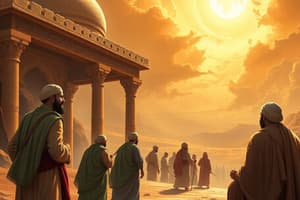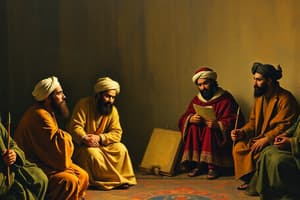Podcast
Questions and Answers
What was the name of the angel who communicated the verses of the Quran to Prophet Muhammad?
What was the name of the angel who communicated the verses of the Quran to Prophet Muhammad?
- Michael
- Raphael
- Israfil
- Gabriel (correct)
In what city did Prophet Muhammad assume full leadership responsibilities after his return from the Farewell Pilgrimage?
In what city did Prophet Muhammad assume full leadership responsibilities after his return from the Farewell Pilgrimage?
- Mecca
- Cairo
- Jerusalem
- Medina (correct)
What is the term used to refer to the revelations received by Prophet Muhammad?
What is the term used to refer to the revelations received by Prophet Muhammad?
- Inspiration
- Signs
- Visions
- Wahy (correct)
Which book serves as the foundation of Islamic law, doctrine, and moral values?
Which book serves as the foundation of Islamic law, doctrine, and moral values?
What did Prophet Muhammad leave behind upon his passing that continues to inspire believers today?
What did Prophet Muhammad leave behind upon his passing that continues to inspire believers today?
What marked a turning point in Islamic history?
What marked a turning point in Islamic history?
What was the purpose of Prophet Muhammad according to the text?
What was the purpose of Prophet Muhammad according to the text?
Which city did Prophet Muhammad migrate to in response to persecution?
Which city did Prophet Muhammad migrate to in response to persecution?
What established unity among Muslims and laid the groundwork for Islam's expansion?
What established unity among Muslims and laid the groundwork for Islam's expansion?
How did Prophet Muhammad teach individuals to find their way back to God?
How did Prophet Muhammad teach individuals to find their way back to God?
Flashcards are hidden until you start studying
Study Notes
Prophet Muhammad (SAW): A Journey through Migration, Prophethood, Revelations, and Final Years
Embarking with us today is one of history's most influential figures — Prophet Muhammad (peace be upon him), commonly referred to as the Messenger of Allah. As we delve into his life story, let's highlight four key aspects: al-hijra (migration) to Medina, the nature of his prophethood, divine revelations, and events from the closing stages of his remarkable journey.
Al-Hijrah: From Mecca to Medina
In response to escalating persecution in Mecca during the early seventh century, Prophet Muhammad led the first Muslim emigrants to Medina. This event, known as al-hijrah, marked a turning point in Islamic history, setting forth a new model for community organization and establishment. In Medina, Prophet Muhammad entered into a covenant called the Constitution of Medina, which united various factions within the city under a single banner. He also began to build the foundational principles of Islam, fostering unity among Muslims and laying the groundwork for the expansion of his message.
Prophethood: Spreading God's Word
God revealed His will to humanity through Prophet Muhammad, who acted as a channel between humankind and Divinity. His role was not merely to deliver messages; he embodied the entirety of God's guidance, teaching by example how individuals could find their way back to God and reclaim their purpose in life. Through his charisma, wisdom, and unwavering commitment to truth, Prophet Muhammad inspired people to follow God's path, earning him millions of followers around the globe.
Divine Revelations: The Quran
The essence of Prophet Muhammad's mission lies in the Quran, the holy book revealed to him over a span of twenty-three years by Archangel Gabriel. Referred to as wahy (revelation), these verses were communicated directly to Prophet Muhammad, providing comprehensive guidance on every aspect of human society while simultaneously preserving its original scripture: the Torah, Psalms, Gospel, and other ancient texts. The Quran serves as the foundation of Islamic law, doctrine, worship, ethics, and moral values. It stands as the supreme authority on all areas of Muslim belief and practice.
The Last Stages: Rise to Leadership and Legacy
After returning from the Farewell Pilgrimage, Prophet Muhammad assumed full leadership responsibilities in Medina, consolidating his position as a respected statesman and religious leader. During this period, he continued to spread knowledge both verbally and through writing, compiling many teachings and traditions. His efforts culminated in the formation of an integrated social system based on religion, politics, economics, and culture. Upon his passing, Prophet Muhammad left behind both an exemplary life and lasting impact on subsequent generations of believers. Today, more than fourteen centuries after his death, his legacy lives on as a source of hope, inspiration, and guidance for untold numbers of men and women worldwide.
As you have discovered, Prophet Muhammad played an integral part in shaping our understanding of faith, science, and civilization. By embracing the lessons imparted by this magnificent figure, we can continue to grow closer to reaching our own full potential and harmoniously coexist with others.
Studying That Suits You
Use AI to generate personalized quizzes and flashcards to suit your learning preferences.




